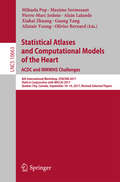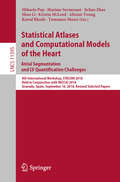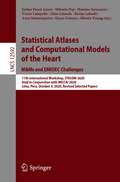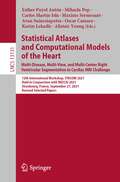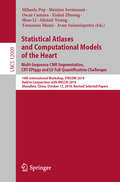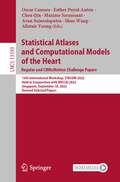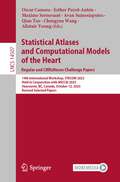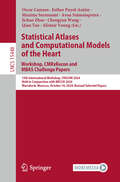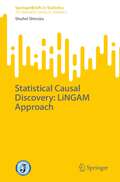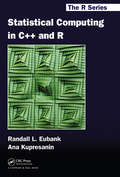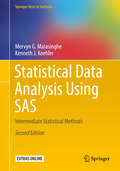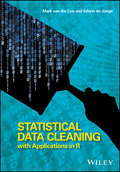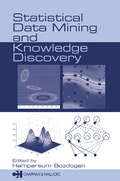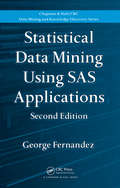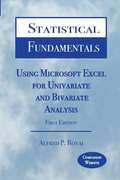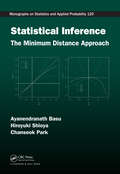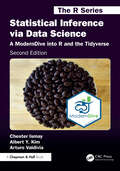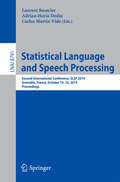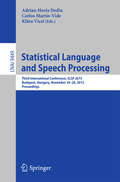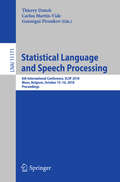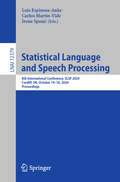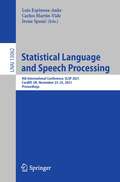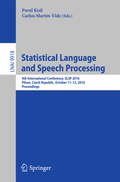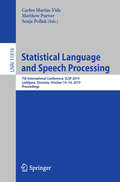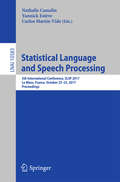- Table View
- List View
Statistical Atlases and Computational Models of the Heart. ACDC and MMWHS Challenges: 8th International Workshop, Stacom 2017, Held In Conjunction With Miccai 2017, Quebec City, Canada September 10 - 14, 2017 Revised Selected Papers (Lecture Notes in Computer Science #10663)
by Mihaela Pop Maxime Sermesant Pierre-Marc Jodoin Alain Lalande Xiahai Zhuang Guang Yang Alistair Young Olivier BernardThis book constitutes the thoroughly refereed post-workshop proceedings of the 8th International Workshop on Statistical Atlases and Computational Models of the Heart: ACDC and MMWHS Challenges 2017, held in conjunction with MICCAI 2017, in Quebec, Canada, in September 2017. The 27 revised full workshop papers were carefully reviewed and selected from 35 submissions. The papers cover a wide range of topics computational imaging and modelling of the heart, as well as statistical cardiac atlases. The topics of the workshop included: cardiac imaging and image processing, atlas construction, statistical modelling of cardiac function across different patient populations, cardiac computational physiology, model customization, atlas based functional analysis, ontological schemata for data and results, integrated functional and structural analyses, as well as the pre-clinical and clinical applicability of these methods. Besides regular contributing papers, additional efforts of STACOM workshop were also focused on two challenges: ACDC and MM-WHS.
Statistical Atlases and Computational Models of the Heart. Atrial Segmentation and LV Quantification Challenges: 9th International Workshop, STACOM 2018, Held in Conjunction with MICCAI 2018, Granada, Spain, September 16, 2018, Revised Selected Papers (Lecture Notes in Computer Science #11395)
by Mihaela Pop Maxime Sermesant Jichao Zhao Shuo Li Kristin McLeod Alistair Young Kawal Rhode Tommaso MansiThis book constitutes the thoroughly refereed post-workshop proceedings of the 9th International Workshop on Statistical Atlases and Computational Models of the Heart: Atrial Segmentation and LV Quantification Challenges, STACOM 2018, held in conjunction with MICCAI 2018, in Granada, Spain, in September 2018. The 52 revised full workshop papers were carefully reviewed and selected from 60 submissions. The topics of the workshop included: cardiac imaging and image processing, machine learning applied to cardiac imaging and image analysis, atlas construction, statistical modelling of cardiac function across different patient populations, cardiac computational physiology, model customization, atlas based functional analysis, ontological schemata for data and results, integrated functional and structural analyses, as well as the pre-clinical and clinical applicability of these methods.
Statistical Atlases and Computational Models of the Heart. M&Ms and EMIDEC Challenges: 11th International Workshop, STACOM 2020, Held in Conjunction with MICCAI 2020, Lima, Peru, October 4, 2020, Revised Selected Papers (Lecture Notes in Computer Science #12592)
by Esther Puyol Anton Mihaela Pop Maxime Sermesant Victor Campello Alain Lalande Karim Lekadir Avan Suinesiaputra Oscar Camara Alistair YoungThis book constitutes the proceedings of the 11th International Workshop on Statistical Atlases and Computational Models of the Heart, STACOM 2020, as well as two challenges: M&Ms - The Multi-Centre, Multi-Vendor, Multi-Disease Segmentation Challenge, and EMIDEC - Automatic Evaluation of Myocardial Infarction from Delayed-Enhancement Cardiac MRI Challenge. The 43 full papers included in this volume were carefully reviewed and selected from 70 submissions. They deal with cardiac imaging and image processing, machine learning applied to cardiac imaging and image analysis, atlas construction, artificial intelligence, statistical modelling of cardiac function across different patient populations, cardiac computational physiology, model customization, atlas based functional analysis, ontological schemata for data and results, integrated functional and structural analyses, as well as the pre-clinical and clinical applicability of these methods.
Statistical Atlases and Computational Models of the Heart. Multi-Disease, Multi-View, and Multi-Center Right Ventricular Segmentation in Cardiac MRI Challenge: 12th International Workshop, STACOM 2021, Held in Conjunction with MICCAI 2021, Strasbourg, France, September 27, 2021, Revised Selected Papers (Lecture Notes in Computer Science #13131)
by Oscar Camara Mihaela Pop Maxime Sermesant Alistair Young Avan Suinesiaputra Karim Lekadir Esther Puyol Antón Carlos Martín-IslaThis book constitutes the proceedings of the 12th International Workshop on Statistical Atlases and Computational Models of the Heart, STACOM 2021, as well as the M&Ms-2 Challenge: Multi-Disease, Multi-View and Multi-Center Right Ventricular Segmentation in Cardiac MRI Challenge.The 25 regular workshop papers included in this volume were carefully reviewed and selected after being revised. They deal with cardiac imaging and image processing, machine learning applied to cardiac imaging and image analysis, atlas construction, artificial intelligence, statistical modelling of cardiac function across different patient populations, cardiac computational physiology, model customization, atlas based functional analysis, ontological schemata for data and results, integrated functional and structural analyses, as well as the pre-clinical and clinical applicability of these methods. In addition, 15 papers from the M&MS-2 challenge are included in this volume. The Multi-Disease, Multi-View & Multi-Center Right Ventricular Segmentation in Cardiac MRI Challenge (M&Ms-2) is focusing on the development of generalizable deep learning models for the Right Ventricle that can maintain good segmentation accuracy on different centers, pathologies and cardiac MRI views. There was a total of 48 submissions to the workshop.
Statistical Atlases and Computational Models of the Heart. Multi-Sequence CMR Segmentation, CRT-EPiggy and LV Full Quantification Challenges: 10th International Workshop, STACOM 2019, Held in Conjunction with MICCAI 2019, Shenzhen, China, October 13, 2019, Revised Selected Papers (Lecture Notes in Computer Science #12009)
by Shuo Li Oscar Camara Tommaso Mansi Mihaela Pop Maxime Sermesant Alistair Young Xiahai Zhuang Avan SuinesiaputraThis book constitutes the thoroughly refereed post-workshop proceedings of the 10th International Workshop on Statistical Atlases and Computational Models of the Heart: Atrial Segmentation and LV Quantification Challenges, STACOM 2019, held in conjunction with MICCAI 2019, in Shenzhen, China, in October 2019. The 42 revised full workshop papers were carefully reviewed and selected from 76 submissions. The topics of the workshop included: cardiac imaging and image processing, machine learning applied to cardiac imaging and image analysis, atlas construction, statistical modelling of cardiac function across different patient populations, cardiac computational physiology, model customization, atlas based functional analysis, ontological schemata for data and results, integrated functional and structural analyses, as well as the pre-clinical and clinical applicability of these methods.
Statistical Atlases and Computational Models of the Heart. Regular and CMRxMotion Challenge Papers: 13th International Workshop, STACOM 2022, Held in Conjunction with MICCAI 2022, Singapore, September 18, 2022, Revised Selected Papers (Lecture Notes in Computer Science #13593)
by Oscar Camara Esther Puyol-Antón Chen Qin Maxime Sermesant Avan Suinesiaputra Shuo Wang Alistair YoungThis book constitutes the proceedings of the 13th International Workshop on Statistical Atlases and Computational Models of the Heart, STACOM 2022, held in conjunction with the 25th MICCAI conference. The 34 regular workshop papers included in this volume were carefully reviewed and selected after being revised and deal with topics such as: common cardiac segmentation and modelling problems to more advanced generative modelling for ageing hearts, learning cardiac motion using biomechanical networks, physics-informed neural networks for left atrial appendage occlusion, biventricular mechanics for Tetralogy of Fallot, ventricular arrhythmia prediction by using graph convolutional network, and deeper analysis of racial and sex biases from machine learning-based cardiac segmentation. In addition, 14 papers from the CMRxMotion challenge are included in the proceedings which aim to assess the effects of respiratory motion on cardiac MRI (CMR) imaging quality and examine the robustness of segmentation models in face of respiratory motion artefacts. A total of 48 submissions to the workshop was received.
Statistical Atlases and Computational Models of the Heart. Regular and CMRxRecon Challenge Papers: 14th International Workshop, STACOM 2023, Held in Conjunction with MICCAI 2023, Vancouver, BC, Canada, October 12, 2023, Revised Selected Papers (Lecture Notes in Computer Science #14507)
by Oscar Camara Esther Puyol-Antón Maxime Sermesant Avan Suinesiaputra Qian Tao Chengyan Wang Alistair YoungThis book constitutes the proceedings of the 14th International Workshop on Statistical Atlases and Computational Models of the Heart, STACOM 2023, as well as the Cardiac MRI Reconstruction Challenge, CMRxRecon Challenge. There was a total of 53 submissions to the workshop. The 24 regular workshop papers included in this volume were carefully reviewed and selected from 29 paper submissions. They deal with cardiac segmentation, modelling, strain quantification, registration, statistical shape analysis, and quality control. In addition, 21 papers from the CMRxRecon challenge are included in this volume. They focus on fast CMR image reconstruction and provide a benchmark dataset that enables the broader research community to promote advances in this area of research.
Statistical Atlases and Computational Models of the Heart. Workshop, CMRxRecon and MBAS Challenge Papers.: 15th International Workshop, STACOM 2024, Held in Conjunction with MICCAI 2024, Marrakesh, Morocco, October 10, 2024, Revised Selected Papers (Lecture Notes in Computer Science #15448)
by Oscar Camara Esther Puyol-Antón Maxime Sermesant Avan Suinesiaputra Jichao Zhao Chengyan Wang Qian Tao Alistair YoungThis book constitutes the proceedings of the 15th International Workshop on Statistical Atlases and Computational Models of the Heart, STACOM 2024, held in conjunction with the 27th International conference on Medical Image Computing and Computer Assisted Intervention, MICCAI 2024, in Marrakesh, Morocco in October 2024. The 48 regular workshop papers included in this volume were carefully reviewed and selected from 64 paper submissions. They focus on Regular Papers; Multiclass Bi-Atrial Segmentation Challenge and Cardiac MRI Reconstruction Challenge.
Statistical Causal Discovery: LiNGAM Approach (SpringerBriefs in Statistics)
by Shohei ShimizuThis is the first book to provide a comprehensive introduction to a new semiparametric causal discovery approach known as LiNGAM, with the fundamental background needed to understand it. It offers a general overview of the basics of the LiNGAM approach for causal discovery, estimation principles, and algorithms. This semiparametric approach is one of the most exciting new topics in the field of causal discovery. The new framework assumes parametric assumptions on the functional forms of structural equations but makes no assumption on the distributions of exogenous variables other than non-Gaussianity. It provides data-analysis tools capable of estimating a much wider class of causal relations even in the presence of hidden common causes. This feature is in contrast to conventional nonparametric approaches based on conditional independence of variables. This book is highly recommended to readers who seek an in-depth and up-to-date overview of this new causal discovery approach to advance the technique as well as to those who are interested in applying this approach to real-world problems. This LiNGAM approach should become a standard item in the toolbox of statisticians, machine learners, and practitioners who need to perform observational studies.
Statistical Computing in C++ and R (Chapman & Hall/CRC The R Series)
by Randall L. Eubank Ana KupresaninParallel processing can be ideally suited for the solving of more complex problems in statistical computing. This book discusses code development in C++ and R, before going beyond to look at the valuable use of these two languages in unison. It covers linear equation solution with regression and linear models motivation, optimization with maximum likelihood and nonlinear least squares motivation, and random number generation. While the text does require a working knowledge of basic concepts in statistics and experience in programming, it does not require knowledge specific to C++ or R.
Statistical Data Analysis Using SAS: Intermediate Statistical Methods (Springer Texts in Statistics)
by Mervyn G. Marasinghe Kenneth J. KoehlerThe aim of this textbook (previously titled SAS for Data Analytics) is to teach the use of SAS for statistical analysis of data for advanced undergraduate and graduate students in statistics, data science, and disciplines involving analyzing data.The book begins with an introduction beyond the basics of SAS, illustrated with non-trivial, real-world, worked examples. It proceeds to SAS programming and applications, SAS graphics, statistical analysis of regression models, analysis of variance models, analysis of variance with random and mixed effects models, and then takes the discussion beyond regression and analysis of variance to conclude.Pedagogically, the authors introduce theory and methodological basis topic by topic, present a problem as an application, followed by a SAS analysis of the data provided and a discussion of results. The text focuses on applied statistical problems and methods. Key features include: end of chapter exercises, downloadable SAS code and data sets, and advanced material suitable for a second course in applied statistics with every method explained using SAS analysis to illustrate a real-world problem.New to this edition:• Covers SAS v9.2 and incorporates new commands• Uses SAS ODS (output delivery system) for reproduction of tables and graphics output• Presents new commands needed to produce ODS output• All chapters rewritten for clarity• New and updated examples throughout• All SAS outputs are new and updated, including graphics• More exercises and problems• Completely new chapter on analysis of nonlinear and generalized linear models• Completely new appendixMervyn G. Marasinghe, PhD, is Associate Professor Emeritus of Statistics at Iowa State University, where he has taught courses in statistical methods and statistical computing.Kenneth J. Koehler, PhD, is University Professor of Statistics at Iowa State University, where he teaches courses in statistical methodology at both graduate and undergraduate levels and primarily uses SAS to supplement his teaching.
Statistical Data Cleaning with Applications in R
by Mark van der Loo Edwin De JongeA comprehensive guide to automated statistical data cleaning <p><p> The production of clean data is a complex and time-consuming process that requires both technical know-how and statistical expertise. Statistical Data Cleaning with Applications in R brings together a wide range of techniques for cleaning textual, numeric or categorical data. This book examines technical data cleaning methods relating to data representation and data structure. A prominent role is given to statistical data validation, data cleaning based on predefined restrictions, and data cleaning strategy.
Statistical Data Mining and Knowledge Discovery
by Hamparsum BozdoganMassive data sets pose a great challenge to many cross-disciplinary fields, including statistics. The high dimensionality and different data types and structures have now outstripped the capabilities of traditional statistical, graphical, and data visualization tools. Extracting useful information from such large data sets calls for novel approache
Statistical Data Mining Using SAS Applications (Chapman & Hall/CRC Data Mining and Knowledge Discovery Series)
by George FernandezStatistical Data Mining Using SAS Applications, Second Edition describes statistical data mining concepts and demonstrates the features of user-friendly data mining SAS tools. Integrating the statistical and graphical analysis tools available in SAS systems, the book provides complete statistical data mining solutions without writing SAS program co
Statistical Fundamentals: Using Microsoft Excel for Univariate and Bivariate Analysis
by Alfred P. RovaiThe purpose of this book is to provide a working background of descriptive and inferential statistics and step-by-step examples of how to perform various statistical procedures using Microsoft Excel's native operators and functions. Automated procedures are also described using Excel's Analysis TookPak and AnalystSoft StatPlus.
Statistical Inference: The Minimum Distance Approach (Chapman & Hall/CRC Monographs on Statistics and Applied Probability)
by Ayanendranath Basu Hiroyuki Shioya Chanseok ParkIn many ways, estimation by an appropriate minimum distance method is one of the most natural ideas in statistics. However, there are many different ways of constructing an appropriate distance between the data and the model: the scope of study referred to by "Minimum Distance Estimation" is literally huge. Filling a statistical resource gap, Stati
Statistical Inference via Data Science: A ModernDive into R and the Tidyverse (Chapman & Hall/CRC The R Series)
by Chester Ismay Albert Y. Kim Arturo ValdiviaStatistical Inference via Data Science: A ModernDive into R and the Tidyverse, Second Edition offers a comprehensive guide to learning statistical inference with data science tools widely used in industry, academia, and government. The first part of this book introduces the tidyverse suite of R packages, including ggplot2 for data visualization and dplyr for data wrangling. The second part introduces data modeling via simple and multiple linear regression. The third part presents statistical inference using simulation-based methods within a general framework implemented in R via the infer package, a suitable complement to the tidyverse. By working with these methods, readers can implement effective exploratory data analyses, conduct statistical modeling with data, and carry out statistical inference via confidence intervals and hypothesis testing. All of these tasks are performed by strongly emphasizing data visualization.Key Features in the Second Edition: Minimal Prerequisites: No prior calculus or coding experience is needed, making the content accessible to a wide audience. Real-World Data: Learn with real-world datasets, including all domestic flights leaving New York City in 2023, the Gapminder project, FiveThirtyEight.com data, and new datasets on health, global development, music, coffee quality, and geyser eruptions. Simulation-Based Inference: Statistical inference through simulation-based methods. Expanded Theoretical Discussions: Includes deeper coverage of theory-based approaches, their connection with simulation-based approaches, and a presentation of intuitive and formal aspects of these methods. Enhanced Use of the infer Package: Leverages the infer package for “tidy” and transparent statistical inference, enabling readers to construct confidence intervals and conduct hypothesis tests through multiple linear regression and beyond. Dynamic Online Resources: All code and output are embedded in the text, with additional interactive exercises, discussions, and solutions available online. Broadened Applications: Suitable for undergraduate and graduate courses, including statistics, data science, and courses emphasizing reproducible research. The first edition of the book has been used in so many different ways--for courses in statistical inference, statistical programming, business analytics, and data science for social policy, and by professionals in many other means. Ideal for those new to statistics or looking to deepen their knowledge, this edition provides a clear entry point into data science and modern statistical methods.
Statistical Language and Speech Processing
by Laurent Besacier Adrian-Horia Dediu Carlos Martín-VideThis book constitutes the refereed proceedings of the Second International Conference on Statistical Language and Speech Processing, SLSP 2014, held in Grenoble, France, in October 2014. The 18 full papers presented together with three invited talks were carefully reviewed and selected from 53 submissions. The papers are organized in topical sections on machine translation, speech and speaker recognition, machine learning methods, text extraction and categorization, and mining text.
Statistical Language and Speech Processing
by Adrian-Horia Dediu Carlos Martín-Vide Klára VicsiThis book constitutes the refereed proceedings of theThird International Conference on Statistical Language and Speech Processing,SLSP 2015, held in Budapest, Hungary, in November 2015. The 26 full papers presented together with twoinvited talks were carefully reviewed and selected from 71 submissions. Thepapers cover topics such as: anaphora and coreference resolution; authorshipidentification, plagiarism and spam filtering; computer-aided translation;corpora and language resources; data mining and semantic Web; informationextraction; information retrieval; knowledge representation and ontologies;lexicons and dictionaries; machine translation; multimodal technologies;natural language understanding; neural representation of speech and language;opinion mining and sentiment analysis; parsing; part-of-speech tagging;question-answering systems; semantic role labelling; speaker identification andverification; speech and language generation; speech recognition; speechsynthesis; speech transcription; spelling correction; spoken dialogue systems;term extraction; text categorisation; text summarisation; and user modeling.
Statistical Language and Speech Processing: 6th International Conference, SLSP 2018, Mons, Belgium, October 15–16, 2018, Proceedings (Lecture Notes in Computer Science #11171)
by Thierry Dutoit Carlos Martín-Vide Gueorgui PironkovThis book constitutes the proceedings of the 6th International Conference on Statistical Language and Speech Processing, SLSP 2018, held in Mons, Belgium, in October 2018. The 15 full papers presented in this volume were carefully reviewed and selected from 40 submissions. They were organized in topical sections named: speech synthesis and spoken language generation; speech recognition and post-processing; natural language processing and understanding; and text processing and analysis.
Statistical Language and Speech Processing: 8th International Conference, SLSP 2020, Cardiff, UK, October 14–16, 2020, Proceedings (Lecture Notes in Computer Science #12379)
by Luis Espinosa-Anke Carlos Martín-Vide Irena SpasićThis book constitutes the proceedings of the 8th International Conference on Statistical Language and Speech Processing, SLSP 2020, held in Cardiff, UK, in October 2020. The 13 full papers presented together with one invited paper in this volume were carefully reviewed and selected from 25 submissions. They papers cover the wide spectrum of statistical methods that are currently in use in computational language or speech processing.
Statistical Language and Speech Processing: 9th International Conference, SLSP 2021, Virtual Event, November 22-26, 2021, Proceedings (Lecture Notes in Computer Science #13062)
by Luis Espinosa-Anke Carlos Martín-Vide Irena SpasićThis book constitutes the proceedings of the 9th International Conference on Statistical Language and Speech Processing, SLSP 2021, held in Cardiff, UK, in November 2021.The 9 full papers presented in this volume were carefully reviewed and selected from 21 submissions. The papers present topics of either theoretical or applied interest discussing the employment of statistical models (including machine learning) within language and speech processing.
Statistical Language and Speech Processing: 4th International Conference, SLSP 2016, Pilsen, Czech Republic, October 11-12, 2016, Proceedings (Lecture Notes in Computer Science #9918)
by Pavel Král Carlos Martín-VideThis book constitutes the refereed proceedings of the 4th International Conference on Statistical Language and Speech Processing, SLSP 2016, held in Pilsen, Czech Republic, in October 2016. The 11 full papers presented together with two invited talks were carefully reviewed and selected from 38 submissions. The papers cover topics such as anaphora and coreference resolution; authorship identification, plagiarism and spam filtering; computer-aided translation; corpora and language resources; data mining and semantic web; information extraction; information retrieval; knowledge representation and ontologies; lexicons and dictionaries; machine translation; multimodal technologies; natural language understanding; neural representation of speech and language; opinion mining and sentiment analysis; parsing; part-of-speech tagging; question and answering systems; semantic role labeling; speaker identification and verification; speech and language generation; speech recognition; speech synthesis; speech transcription; speech correction; spoken dialogue systems; term extraction; text categorization; test summarization; user modeling.
Statistical Language and Speech Processing: 7th International Conference, SLSP 2019, Ljubljana, Slovenia, October 14–16, 2019, Proceedings (Lecture Notes in Computer Science #11816)
by Carlos Martín-Vide Matthew Purver Senja PollakThis book constitutes the proceedings of the 7th International Conference on Statistical Language and Speech Processing, SLSP 2019, held in Ljubljana, Slovenia, in October 2019. The 25 full papers presented together with one invited paper in this volume were carefully reviewed and selected from 48 submissions. They were organized in topical sections named: Dialogue and Spoken Language Understanding; Language Analysis and Generation; Speech Analysis and Synthesis; Speech Recognition; Text Analysis and Classification.
Statistical Language and Speech Processing: 5th International Conference, SLSP 2017, Le Mans, France, October 23–25, 2017, Proceedings (Lecture Notes in Computer Science #10583)
by Nathalie Camelin, Yannick Estève and Carlos Martín-VideThis book constitutes the refereed proceedings of the 5th International Conference on Statistical Language and Speech Processing, SLSP 2017, held in Le Mans, France, in October 2017. The 21 full papers presented were carefully reviewed and selected from 39 submissions. The papers cover topics such as anaphora and conference resolution; authorship identification, plagiarism and spam filtering; computer-aided translation; corpora and language resources; data mining and semanticweb; information extraction; information retrieval; knowledge representation and ontologies; lexicons and dictionaries; machine translation; multimodal technologies; natural language understanding; neural representation of speech and language; opinion mining and sentiment analysis; parsing; part-of-speech tagging; question and answering systems; semantic role labeling; speaker identification and verification; speech and language generation; speech recognition; speech synthesis; speech transcription; speech correction; spoken dialogue systems; term extraction; text categorization; test summarization; user modeling. They are organized in the following sections: language and information extraction; post-processing and applications of automatic transcriptions; speech paralinguistics and synthesis; speech recognition: modeling and resources.
